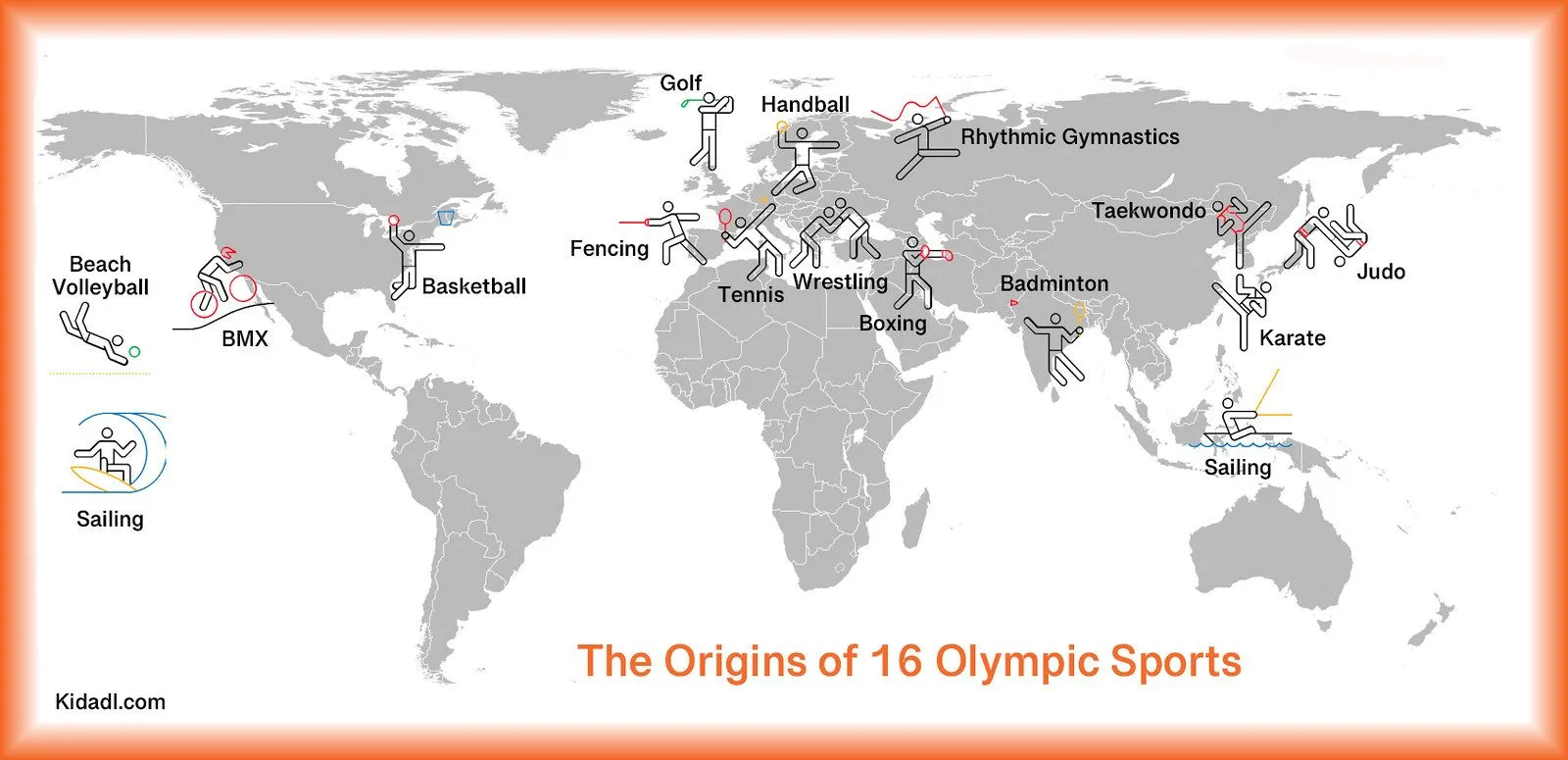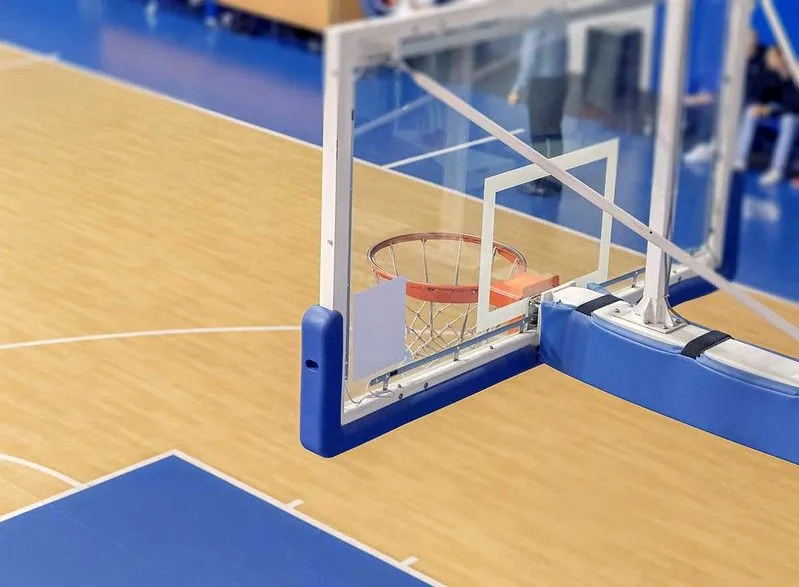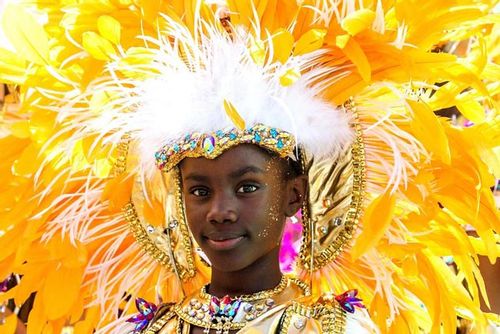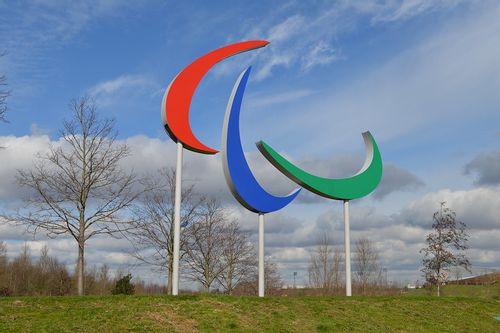FOR ALL AGES
The summer Olympics brings together athletes from almost every nation on Earth, but it also showcases sports from all over the planet. Did you know that surfing has its origins in Hawaii, or that boxing was first recorded in what is now Iraq? Meanwhile, basketball and volleyball were invented within 10 miles, and four years of one another.
We’ve chosen 16 events from the modern Summer Olympics to show just how internationally diverse the competition is. We’ve generally chosen sports that have a definitive origin, rather than pursuits such as running, jumping and swimming, which are universal and ancient.

Country of origin: India
How it started: Feathered weights resembling shuttlecocks have been batted about all over the world for centuries. More structured games resembling badminton are first documented in the 19th century. The modern game is often traced to Poona in the Indian State of Maharashtra, where British officers developed some of the rules. These were later transplanted back to England, where the game took off. The curious name comes from the Duke of Beaufort’s home of Badminton House in Gloucestershire, England - yet, oddly, nobody is quite sure why.
First Olympics: Despite its huge popularity around the world, badminton didn’t make it to the Olympics until Munich 1972, and only then as a demonstration sport. It was fully accepted to the Olympics at Barcelona 1992.

Country of origin: USA (Massachusetts)
How it started: It’s no surprise to learn that basketball was invented in America, the country where it still enjoys enormous popularity. It was a Canadian, though - PE teacher James Naismith - who invented the game. Naismith, working at what is now Springfield College, Massachusetts, laid down the rules in 1891, using the game as a way to keep students active indoors during wet weather. A soccer ball was used for early games. Curiously, the Olympic sport of volleyball was invented just 10 miles away in 1895.
First Olympics: The sport has been bouncing around at the Olympics since first featuring as a demonstration game in 1904. It reappeared in 1924, and settled into a permanent fixture in Berlin 1936.
Country of origin: Hawaii
How it started: Although long associated with California, the first recorded game took place on Waikiki Beach, Hawaii in 1915. Then, as now, the game is very similar to indoor volleyball, which was invented in 1895 in Massachusetts (see basketball).
First Olympics: Beach volleyball debuted at the Atlanta 1996 games.
Country of origin: USA
How it started: Somewhat surprisingly, BMX racing dates back only to the 1970s, when children began racing bikes around dirt tracks in southern California. Soon, bikes made especially for dirt tracks became popular, and official league tables were set up. BMX freestyle began shortly thereafter, with riders competing to perform tricks on skateboard ramps.
First Olympics: BMX racing became an Olympic sport at Beijing 2008, while BMX freestyle had to wait until Tokyo 2020 (2021).
Country of origin: Ancient Sumer
How it started: People have probably been throwing punches at each other since before we were fully human. The first recorded competitive boxing, though, is a relief image from ancient Sumer (in modern-day Iraq) from the third millennium BCE. The first depiction showing gloves is almost as old, and from Minoan Crete. Modern codified boxing can trace its origins to 19th century London.
First Olympics: Boxing has been an Olympic sport since 1904, and was also one of the prominent sports of the ancient Olympics.
Country of origin: Spain
How it started: With terms such as ‘en-garde’, ‘epee’, and ‘allez’, we might easily assume that fencing is a French invention. Written historical evidence, however, points to 15th century Spain as the wellspring of competitive swordplay. The sport flourished in both Spain and Italy before taking route in France, where the modern form and terminology were cemented.
First Olympics: Fencing has been a mainstay of the Olympics since the first games in 1896.
Country of origin: Scotland
How it started: Many ancient civilizations, including the Romans and the Ming Dynasty, had golf-like games, in which a ball is knocked towards a hole. The modern game, though, was developed in Scotland from the 15th century. The first recorded mention of the game is from 1457, when James II banned it (under the impression that it was distracting his subjects from practicing their archery). St Andrews had the first standard golf course, with 18 holes, as early as 1764.
First Olympics: Although golf was an early Olympic sport, present at both the 1900 and 1904 Olympics, it got knocked into the long grass for 112 years, to re-emerge at the Rio 2016 games.
Country of origin: Denmark
How it started: Handball-like games were played in ancient Greece, but the modern game has its origins in northern Europe. The rules were gradually developed across Denmark, Germany, Sweden and Norway in the late 19th century, and first codified by the Danish athlete Holger Nielsen in 1906. Nielsen was himself an Olympian, bagging medals for fencing and shooting, but never handball, which did not enter the Olympics until late in his life.
First Olympics: Debuted in Berlin 1936, but not fully featured again until Munich 1972.
Country of origin: Japan
How it started: Judo developed in Japan out of jiu jitsu in the 1880s and quickly went on to become the most popular martial art in the wider world. More than most Olympic sports, its creation can be attributed to one man. Jigoro Kano developed the techniques and promoted judo not as a sport but as a discipline or way of life. For this reason, he always remained ambivalent about its possible inclusion at the Olympics, though he did oversee an informal demonstration at Los Angeles 1932.
First Olympics: Men’s judo debuted, appropriately, at the Tokyo Olympics of 1964, though it wasn’t until 1992 that a women’s event was established.
Country of origin: Ryukyu Kingdom (Japan)
How it started: Along with judo, karate is perhaps the best known and most practiced martial art in the western world. It originated hundreds of years ago on the Ryukyu Islands, now part of Japan, but once an independent kingdom. It matured as a discipline in the 19th century and became popular throughout Japan. The martial art spread to the West after the Second World War, partly through American servicemen who had been stationed in Okinawa.
First Olympics: Despite widespread popularity, karate did not make it to the Olympics until Tokyo 2020 (2021).
Country of origin: Soviet Union
How it started: This combination of gymnastics with dance includes various pieces of apparatus such as hoop, ball, clubs, ribbon or rope. The discipline grew through developments in several countries, including Sweden, France, the USA and Switzerland. But it was in the Soviet Union that competitive rhythmic gymnastics began, in the 1940s.
First Olympics: While conventional gymnastics have been part of the Games since the first modern Olympics, the rhythmic version had to wait until Los Angeles 1984.
Country of origin: Austronesian People
How it started: The simple technology of moving a boat with a sail is of very ancient origin. Historians believe that the first ocean-going sail boats were pioneered by the Austronesian people, perhaps 5,000 years ago. It was these vessels that allowed humans to spread out from what is now Taiwan, and populate the many islands of Southeast Asia and the Pacific. Competitive sailing has also been part of human culture since ancient times.
First Olympics: Reflecting its long-standing history, sailing has been part of the Olympics almost since the beginning, debuting in Paris 1900.
Country of origin: Hawaii/Polynesia
How it started: Surfing’s roots go back to prehistory, and the activity was always an important part of Polynesian culture, especially on the Hawaiian islands. From there, the sport spread to California in the late 19th century.
First Olympics: It took until Japan 2020 for surfing to ride the Olympic wave. Given that the sport requires a certain kind of beach, it’s not guaranteed that the event can be held at all future Games.
Country of origin: South Korea
How it started: Taekwondo is a martial art reliant on punches and kicks. It is a relatively modern discipline, beginning only in the 1950s within the Korean military. It is a development of earlier Korean martial arts.
First Olympics: The discipline was demonstrated, as you might expect, at the Seoul 1988 Olympics. It became a full medal event at Sydney 2000.
Country of origin: France
How it started: Several countries can lay claim to inventing tennis. The true picture is somewhat complex, with numerous influences feeding in to form the modern game. The oldest known antecedent is a 13th century game from northern France, in which the ball was struck with the palm of the hand. This later evolved into the game of ‘real tennis’, associated with royalty. King Louis X of France is history’s first known (by name) tennis player, though only because he died after drinking too much wine, following a match. The modern game was largely developed in England.
First Olympics: Tennis was part of the very first modern Olympics in 1896, but did not stick around as a permanent fixture. Only in Seoul 1988 did it become a mainstay.
Country of origin: Ancient Greece
How it started: Wrestling of one kind or another predates our species. Many apes and monkeys will grapple with one another to establish hierarchy. As a pastime, it dates back at least 15,000 years, as recorded in cave paintings. In that sense, it is slightly meaningless to give a location for the origins of wrestling. That said, the sport is intimately associated with the Ancient Greek Olympics. Indeed, the form practiced at the modern Olympics is still known as Greco-Roman wrestling.
First Olympics: Wrestling was part of the first Olympics in 1896. It skipped the 1900 Games, but has been part of the event ever since 1904.
How to get kids interested in sport
Visit the Queen Elizabeth Olympic Park in London
Read The Disclaimer
At Kidadl we pride ourselves on offering families original ideas to make the most of time spent together at home or out and about, wherever you are in the world. We strive to recommend the very best things that are suggested by our community and are things we would do ourselves - our aim is to be the trusted friend to parents.
We try our very best, but cannot guarantee perfection. We will always aim to give you accurate information at the date of publication - however, information does change, so it’s important you do your own research, double-check and make the decision that is right for your family.
Kidadl provides inspiration to entertain and educate your children. We recognise that not all activities and ideas are appropriate and suitable for all children and families or in all circumstances. Our recommended activities are based on age but these are a guide. We recommend that these ideas are used as inspiration, that ideas are undertaken with appropriate adult supervision, and that each adult uses their own discretion and knowledge of their children to consider the safety and suitability.
Kidadl cannot accept liability for the execution of these ideas, and parental supervision is advised at all times, as safety is paramount. Anyone using the information provided by Kidadl does so at their own risk and we can not accept liability if things go wrong.
Kidadl is independent and to make our service free to you the reader we are supported by advertising.
We hope you love our recommendations for products and services! What we suggest is selected independently by the Kidadl team. If you purchase using the buy now button we may earn a small commission. This does not influence our choices. Please note: prices are correct and items are available at the time the article was published.
Kidadl has a number of affiliate partners that we work with including Amazon. Please note that Kidadl is a participant in the Amazon Services LLC Associates Program, an affiliate advertising program designed to provide a means for sites to earn advertising fees by advertising and linking to amazon.
We also link to other websites, but are not responsible for their content.
Was this article helpful?



Browse Category

We’ll send you tons of inspiration to help you find a hidden gem in your local area or plan a big day out.



Check your inbox for your latest news from us. You have subscribed to:
Remember that you can always manage your preferences or unsubscribe through the link at the foot of each newsletter.